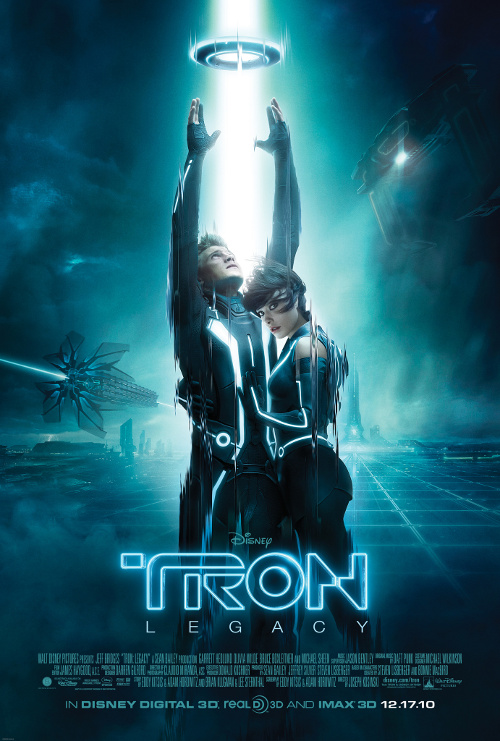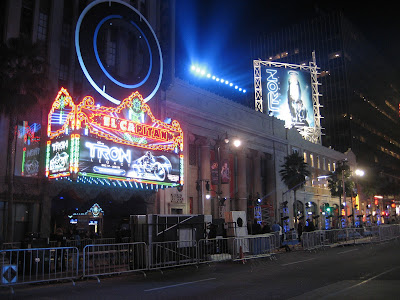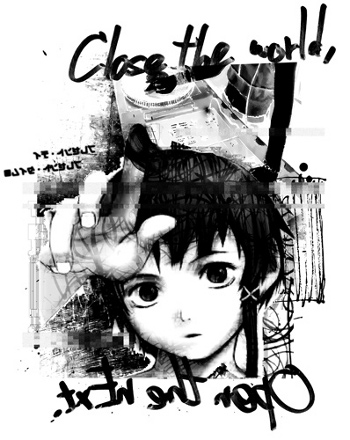(Note: the following article is pretty much spoiler-free regarding the plot of both Tron and Tron: Legacy; it's also really long...)
Today is Tron: Legacy day. By now, a lot of people have seen the movie or are about to. Personally, I was very lucky to have seen it last weekend--at the Hollywood premiere--courtesy of a contest I won
sponsored by ESET (makers of the antivirus software I use).
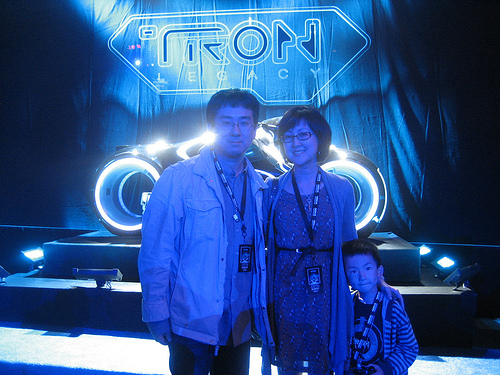
Even had I not gone to the premiere (and after-party), which was awesome (see my wife's
blog post about the event and my photos here:
Tron: Legacy Hollywood premiere), I surely would have gone to see Tron: Legacy as soon as humanly possible. It's a movie I waited for with eager anticipation ever since I heard about it at Comic-Con in 2008, and something I've been thinking about for decades, ever since I watched and fell in love with the original back in the 80s.
After watching Tron: Legacy, I was left with very mixed emotions, which I'll explain in more detail below. Even as I write this, I'm ambivalent, and I have a feeling that future viewings of the movie will continue to affect my opinions of it. Since Saturday, I haven't been able to stop thinking about Tron: Legacy and now I'd like to share my thoughts on it.
Tron's enduring role in my life
You see, Tron: Legacy isn't just this year's holiday blockbuster to me. That's because Tron (1982) isn't just a movie that briefly entertained me as a kid. Tron has been, and still is, one of
my favorite movies of all time (easily in my top 10). I didn't see it in the theater, but I watched it on television around 1984 or so, an experience I remember vividly (I was 8 years old). My friends and I discussed light cycles at school, and we thought
Tron: Deadly Discs on Intellivision (YouTube link) was the coolest game ever. My parents never let me buy a lot of toys, so I remember being very envious of my friends who had Tron action figures and light cycles. It wasn't just the effects that I liked; every aspect of the story appealed to me, and every scene sucked me in (even the ones a lot of people consider boring). As an idealistic kid, I was able to enjoy Tron as a fantasy/allegory, as opposed to a sci-fi film that requires a strong real-world premise (which you won't find in Tron if you mistakenly look for it).
When I discovered that my local public library had the VHS tape of Tron, I promptly checked it out. Over the two days I had the movie at home, I watched it a total of 8 times. To this day, I've never rewatched anything that many times in such a short time span.
During my first few weeks of college, I discovered and fully jumped into online fandom for the first time--interacting with fellow science fiction, fantasy, and anime fans. In one of my earliest Usenet posts ever (dated September 9th, 1994, on alt.cult-movies),
I wrote about Tron:
I love this movie! I have the novelization and I like the
Peoplemover ride at Disneyland only because it has a TRON sequence in it.
Anyhow, I don't know anyone (other than myself) who liked the movie that
much. Any idea where I can find a soundtrack for it?
Lawrence
This was before the soundtrack was available on CD. Someone responded to my query and actually
mailed me the actual soundtrack (on cassette) for free!

(I read this so much, it fell apart)
Laserdisc collectors will fondly remember Ken Crane's LaserDisc SuperStore. It wasn't that far from where I lived, so one summer I went there and rented the Tron laserdisc (from Disney's Exclusive Archive Collection). Before the
20th anniversary edition of the Tron DVD
came out, the laserdisc set (which I now own) was the only way one could watch the special features explaining how Tron was made. After watching those special features, my appreciation of Tron went through the roof.


(Tron on laserdisc)
As a child of the 80s, I was primed to be influenced by Tron, and influence me it did. I'm not sure it's accurate to say that I got into computers and information technology because of Tron, but it certainly colored my technological worldview. Upon learning how Tron was made, I was inspired by the artists who created it and the scope of their accomplishment as storytellers and filmmakers. Sure, Tron didn't do well at the box office, but it also had to compete with E.T., which I
did see in the theater and didn't like. (Ironically, Tron spawned successful video games, whereas the much-hated E.T. game is considered partly responsible for crippling the video game industry for years.)
Tron - an experimental art film disguised as a Disney children's movie
As far as I'm concerned, Tron was an incredible product of the 80s, not just far ahead of its time, but completely unique in its execution. That's why I was always skeptical and not very enthusiastic whenever someone spoke about a Tron sequel. What Tron accomplished could never be done again, I thought. After all, Tron was amazing, not
in spite of the technological hurdles it had to overcome to tell its story, but
because of those hurdles.
In creating Tron, a whole slew of tools and techniques had to be invented to tell the story the way they wanted it. Arguably, using today's technology, it ought to be fairly easy to recreate the look and feel of Tron, but to what end? To make the original Tron, Lisberger et al. used every last bit of technological know-how they could muster, and they strained their imagination to the breaking point to envision a completely artificial, but stunningly beautiful, world of programs that lived and breathed inside our computers.
In one of the laserdisc special features, one of the Tron staff said something to the effect of 'Art is defined by its limitations. The essence of a painting is its frame.' The greatest art is not what you can do with the largest canvas, the fanciest tools, or the biggest palette of colors; it's what you're able to accomplish with the what you have, accepting limitation as the mother of inspiration and true creativity. It's the reason why radio is not necessarily better than books, why television is not necessarily better than radio, why color is not necessarily better than black and white, and why photorealism is not necessarily better than illustration. The examples go on and on. Art needs to be judged in context; in context, what Tron achieved (artistically) was nothing short of amazing.
People routinely mention how Tron was so revolutionary in terms of its computer graphics (which it was), but they often forget that the overall look was achieved via a blend of CGI, traditional animation, live-action (70mm, black and white!), and one-of-a-kind lighting effects. Like its
soundtrack by Wendy Carlos
, combining synthesizer and live orchestra music, Tron is a triumph of both digital and analog technologies, meshed with the artistic and design sensibilities of
Syd Mead and
Jean Giraud (Moebius), visionaries of the highest order.
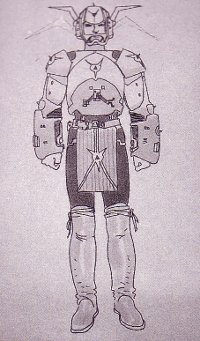
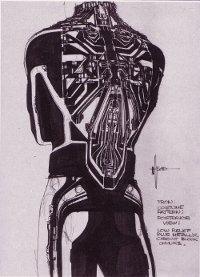
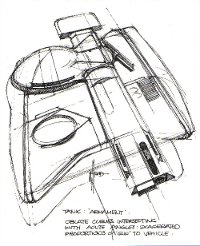
(Tron designs by Syd Mead and Moebius)
So what does this all mean for Tron: Legacy? For me, at least, it meant that Tron: Legacy had a lot to live up to, and doing so was probably not going to be easy. Most of all, I was afraid that a sequel, if ill-conceived and/or poorly executed, would tarnish the legacy of the original. (That's based on my personal conception of the original, of course. I fully realize that most people don't view Tron the same way I do).
Prepping Tron for a new generation
As we got closer to the release of Tron: Legacy, more and more details regarding the film were revealed, preview clips were screened online and in theaters, and a ton of merchandise hit store shelves. The Disney marketing machine has been going all out, and I happily bought into the hype and anticipation. After all, if the images and video clips were any indication, the movie was clearly going to look and sound great. The basic story, as revealed in staff interviews and various story books, seemed like it would be entertaining, and the movie's stars and creators said all the right things when interviewed. It promised to draw in and impress new viewers while giving something back to the old-school fans like myself.
Now, I know that different people look for and appreciate different things in the movies they watch, and people with different personalities and expectations will react very differently to the same film. I find very little value in worrying about how other people judge the art I like, and I similarly don't claim any privileged perspective regarding such art. It's just how I feel, based on my own particular background and personality. I'm not a movie critic, and I don't want to be. What follows is strictly my opinion, and I encourage you to watch the movie for yourself because a) you might like it, b) you might find it interesting, and c) you'll likely be impressed by the spectacle of it on a big screen with theater-grade audio.
My general impression of the movie
All of that said, I was mildly satisfied with Tron: Legacy, which of course means that I wasn't satisfied nearly enough. I guessed that it wouldn't break into my top 10 movies, but I at least hoped it would become one of my favorite movies (which it sadly isn't). I'll still watch it again (in IMAX, since the El Capitan Theatre showed it in Real D), and I will definitely buy it on Blu-Ray, but it's not destined to affect me the same way the original one did, and I doubt it will affect my 5-year-old son in the long run either (though he might prove me wrong, and he definitely had fun watching it!). It was entertaining enough (despite its flaws), just not as groundbreaking or well-told as I wanted it to be.
I also find myself unable to predict how the general movie-going public is going to react to the film. It seems that professional reviewers (about half of them, so far) have been pretty harsh in their assessment. Normally, for certain kinds of movies (like Tron), I don't care about the opinions of mainstream reviewers. This time, however, I found myself agreeing with many of their main criticisms--that the movie looked and sounded great, but had a poor screenplay and suffered from lackluster directing in scenes that should have had dramatic weight, resulting in a treat for the eyes and ears but was not particularly soul-stirring.
To be honest, I've been surprised at how much goodwill the unreleased movie has been getting from a crowd that probably never even watched the original. Daft Punk-hysteria aside, my only explanation is that Tron: Legacy's futuristic aesthetic is appealing to a new generation that's really into technology. Perhaps the look and feel of Tron: Legacy is an affirmation of our gadget lust, serving as proof that we're demonstrating good taste (and good sense) when we buy products because they look nice and have sexy user interfaces. Anticipating Tron: Legacy, like browsing the Web at work, allowed us to escape into a virtual world where everything is cool, entertaining, and the problems we encounter can be solved by the application of more technology. (The actual movie tried to be a bit more complex than that, and some reviewers are already complaining about its pessimistic tone.)
Undeveloped potential
In any case, I was looking for more than aesthetic escapism, and I actually thought the film's concept was generally sound. They tried to tell a compelling story, and everything was in place for them to make a challenging, unconventional film that would inspire cult fandom as well as entertaining the masses. The themes they tackled sounded great on paper--father-son relationships, the perils of playing God, technology out of control, the roots of fascism, the importance of embracing uncertainty, etc. Unfortunately, the overall execution was lacking.
In terms of the storytelling, I feel as if the writers unintentionally made the film worse by including too many things that harkened back to the original Tron. In spending so much time making sure the continuity fit between the old and the new, less time was spent on characterization and meaningful drama. Also, making sure that the new movie had lines of dialogue (and whole scenes) that referenced the original meant fewer scenes that were truly innovative. I'm usually a fan of postmodern pastiche and homage, but all the little "easter eggs" referring to the original movie got boring after awhile. They felt like a cheap way to score some points with the core fans, but I felt pandered to instead of challenged. It's possible that the writers threw in a WarGames reference. If that's true, it's the one bit of homage that I really enjoyed because it was a true inside joke, instead of just being a recycled line from within the same franchise (I'm reminded, sadly, of the Star Wars prequels). I'm no expert on writing movies, but there must be better ways of pleasing old-school fans than simply repeating old material in a slightly different context.
Talkin' 'bout my generation (of storytellers)
I wonder if the age of the director (Joseph Kosinski, b. 1974) and the writers (Edward Kitsis, b. 1971 and Adam Horowitz, b. 1971) had anything to do with it. Those guys are part of my generation, kind of in the vague middle ground between Gen X and Gen Y, born sometime between 1970 and 1982 (for the sake of argument). I'm not really convinced that my generation has produced any great long-form storytellers. We seem to be good at producing commercials, trailers, music videos, YouTube clips, or maybe even TV episodes, but not necessarily feature films or novels. In learning how to please people with short attention spans and a need for instant gratification, are we losing our ability to tell longer and more complex stories that require patience to tell (and enjoy)?
It's not as if my generation is too young. Steven Lisberger, the creator of Tron (1982), was only 31 when it came out, George Lucas was 33 when Star Wars (1977) came out, James Cameron was 30 when Terminator (1984) came out, J.K Rowling published Harry Potter (1997) when she was 32, and John Lasseter was 38 when Toy Story (1995) came out. Of my generation, Christopher Nolan (b. 1970) and Stephenie Meyer (1973) are the only two really successful creators of long-form fiction I can think of, and I list them because of their popularity, not because I particularly like their works. But other than those two, who else is in the running to be the greatest storyteller born between 1970 and 1982?
Reasons to like Tron: Legacy
Story aside, there's no denying the visual splendor of the new film, and I really dig the updated designs, especially the vehicles. I don't at all regret buying the $40
Tron: Legacy art book
and numerous toys for my son. As a veteran
Armagetron addict, I love Kevin Flynn's retro light cycle they designed for the new movie. Unlike the original film, I don't know if any of the special effects in Tron: Legacy will be considered groundbreaking (there's been mixed reaction regarding the 'young Jeff Bridges' effect), but at least it's all nice to look at.
 (Flynn's light cycle, source: /Film)
(Flynn's light cycle, source: /Film)
In the Tron DVD special features, John Lasseter remarked that Pixar would not exist if not for Tron. Will we be able to say something similar about Tron: Legacy? It's hard to imagine, but who knows. In my opinion, the original Tron was greater than the sum of its parts, whereas Tron: Legacy isn't, but those individual parts (such as the epic
soundtrack by Daft Punk
) are praiseworthy nonetheless.
"Like the man says, there's no problems, only solutions."
Tron: Legacy may be flawed, but it's still something I'm glad that I experienced, and I'm not averse to new (and better) stories being told in the universe it portrayed. Indeed, it seems like Disney is getting ready to tell those stories (via a
Tron cartoon, for example) if there's a receptive audience. I hope they take their time and plan carefully if they decide to make Tron 3, however.
I was worried that Tron: Legacy would diminish how I feel about Tron, but that proved not to be the case. Some reviewers who are disappointed with the new film have been eager to point out their dislike of the original, as if that explains the new film's failings. For me, the new Tron (which was disappointing but far from awful) actually makes me appreciate the old one even more, which is a happy ending in my book.
Update (12/31/10):
So, I finally had a chance to rewatch Tron: Legacy, and I have to say that I enjoyed it more the second time around (as expected). Instead of being constantly dismayed at what the movie could have been, I was able to spend more time appreciating it for what it was--looking for its strengths instead of its weaknesses.
There were still moments where I found myself shaking my head in disappointment or disbelief, but overall I was happier. In fact, I want to give Joseph Kosinski a little more credit that I did before, as I noticed a few neat storytelling tricks that I missed the first time.
And sure, I wanted Tron: Legacy to be more inspiring artistically, but I can forgive it for not surpassing the original film in that department. Perhaps the techie side of Tron: Legacy was oversold (the marketing certainly didn't focus on the storytelling), or maybe it's just going to be much harder to inspire the next generation of creative folk.
After all, it takes a lot more to dazzle us now, and the filmmakers were saddled with having to emphasize the past instead of pushing more toward the future. Or maybe I have it all wrong; maybe the special features on the Tron: Legacy Blu-Ray disc will blow me away (like I was blown away by the special features on the Tron laserdisc).
Unfortunately, I'm still less forgiving of Tron: Legacy's storytelling (e.g. its screenplay). I don't mean the story (plot, concepts, etc.), but the way it was told (pacing, structure, perspective, dialogue, and editing). All judgments of artistic achievement aside, I just wanted a well-told story. I actually look forward to seeing if the novelization and/or comic book adaptation does a better job.
As a final note, I do recommend seeing Tron: Legacy in an IMAX theater. Maybe it's just my imagination, but the IMAX picture and sound at my local theater seemed to be better than the picture and sound at the Hollywood premiere (which featured Disney Digital 3D).
